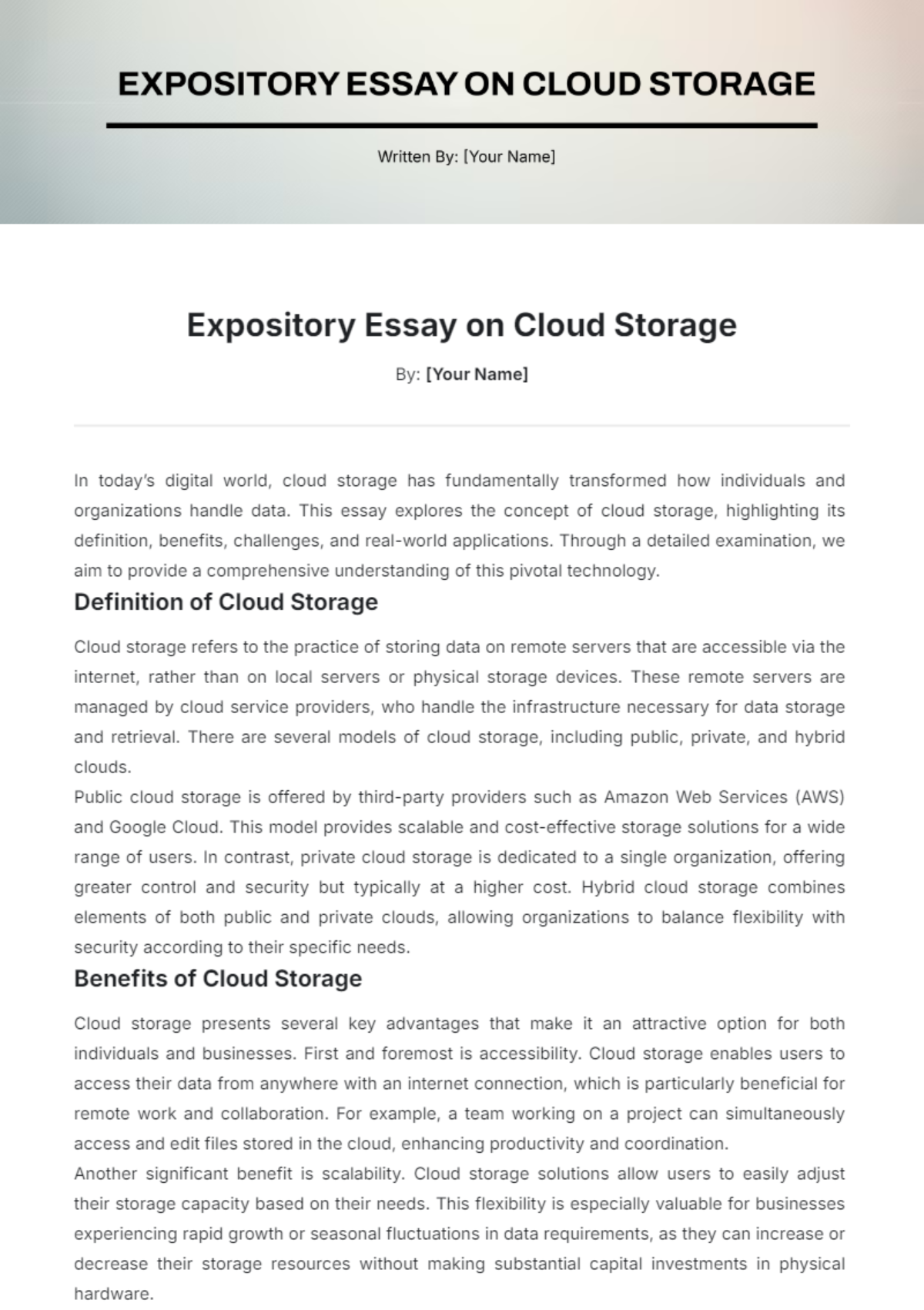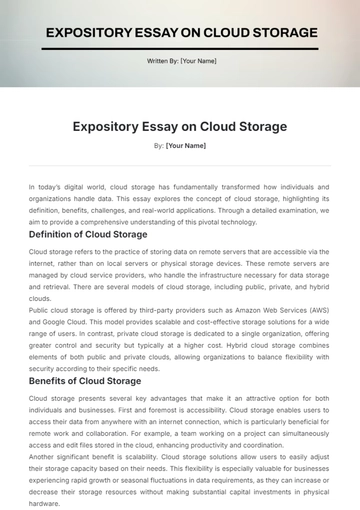Expository Essay on Cloud Storage
By: [Your Name]
In today’s digital world, cloud storage has fundamentally transformed how individuals and organizations handle data. This essay explores the concept of cloud storage, highlighting its definition, benefits, challenges, and real-world applications. Through a detailed examination, we aim to provide a comprehensive understanding of this pivotal technology.
Definition of Cloud Storage
Cloud storage refers to the practice of storing data on remote servers that are accessible via the internet, rather than on local servers or physical storage devices. These remote servers are managed by cloud service providers, who handle the infrastructure necessary for data storage and retrieval. There are several models of cloud storage, including public, private, and hybrid clouds.
Public cloud storage is offered by third-party providers such as Amazon Web Services (AWS) and Google Cloud. This model provides scalable and cost-effective storage solutions for a wide range of users. In contrast, private cloud storage is dedicated to a single organization, offering greater control and security but typically at a higher cost. Hybrid cloud storage combines elements of both public and private clouds, allowing organizations to balance flexibility with security according to their specific needs.
Benefits of Cloud Storage
Cloud storage presents several key advantages that make it an attractive option for both individuals and businesses. First and foremost is accessibility. Cloud storage enables users to access their data from anywhere with an internet connection, which is particularly beneficial for remote work and collaboration. For example, a team working on a project can simultaneously access and edit files stored in the cloud, enhancing productivity and coordination.
Another significant benefit is scalability. Cloud storage solutions allow users to easily adjust their storage capacity based on their needs. This flexibility is especially valuable for businesses experiencing rapid growth or seasonal fluctuations in data requirements, as they can increase or decrease their storage resources without making substantial capital investments in physical hardware.
Cost-effectiveness is another advantage of cloud storage. By leveraging cloud services, organizations can reduce expenses associated with maintaining physical storage infrastructure. Cloud providers often offer pay-as-you-go pricing models, where users pay only for the storage they use. This model eliminates the need for large upfront investments and ongoing maintenance costs.
Additionally, cloud storage solutions typically include automated backup and recovery options, which help protect data against loss or corruption. In the event of hardware failures or accidental deletions, users can quickly restore their data from cloud backups, minimizing downtime and data loss.
Challenges and Risks
Despite its numerous benefits, cloud storage also presents several challenges and risks. Security and privacy concerns are among the most significant. Storing sensitive information on remote servers introduces potential vulnerabilities, such as unauthorized access or data breaches. To mitigate these risks, organizations must implement robust security measures, including encryption and access controls.
Another challenge is downtime and reliability. Cloud storage services depend on internet connectivity and server availability. Any disruption in internet access or server outages can impact users’ ability to access their data. While cloud providers strive to offer high levels of reliability, occasional outages, and performance issues can occur.
Compliance and legal issues also arise with cloud storage, particularly for organizations handling regulated or sensitive data. Different jurisdictions have varying laws and regulations regarding data storage and protection. Therefore, organizations need to ensure that their cloud storage solutions comply with relevant legal requirements and industry standards.
Real-World Applications
Cloud storage is widely utilized across various industries and sectors. In the business sector, solutions like Dropbox and Microsoft OneDrive facilitate collaboration by allowing team members to share files, work on documents simultaneously, and access their work from different devices. This functionality significantly enhances teamwork and productivity.
In the healthcare industry, cloud storage solutions are employed to manage electronic health records (EHRs). Providers such as AWS and Google Cloud offer secure and scalable storage options that help healthcare organizations comply with regulations and improve data accessibility for medical professionals.
Conclusion
Cloud storage has become an essential component of modern data management, offering substantial benefits in terms of accessibility, scalability, and cost-effectiveness. However, it also poses challenges related to security, reliability, and compliance. Understanding these aspects is crucial for effectively utilizing cloud storage solutions and addressing potential risks. As technology continues to advance, cloud storage will likely play an increasingly pivotal role in data management, underscoring the importance of staying informed and prepared to leverage its full potential.
Essay Templates @ Template.net






























